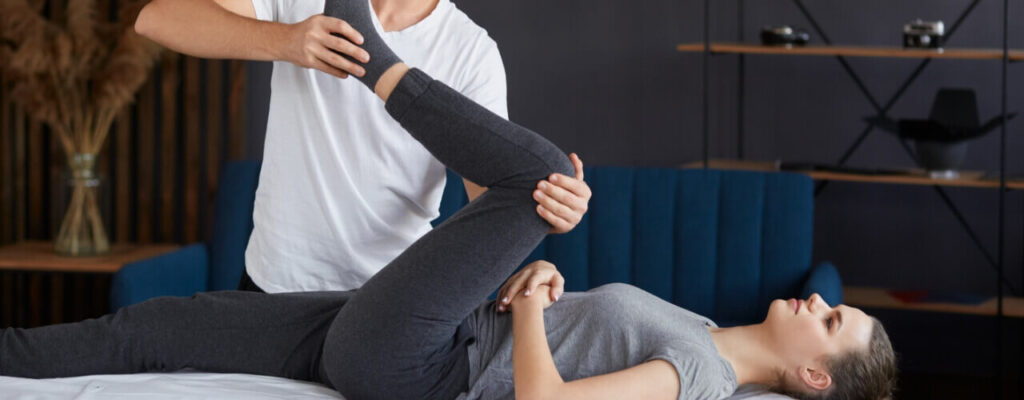Physical Therapy Can Help Your Hips and Knees Move with Ease

Get Moving Comfortably Again with the Help of Physical Therapy!
One of the most common types of pain that develops over time is joint pain.
Joint pain can significantly interfere with your quality of life and ability to move around freely, whether as a result of wear and tear over time or as a result of an injury that has never healed properly.
The hips and knees are two of the most common locations for joint pain.
How can I tell if my pain is chronic?
It is critical to your daily comfort to be able to move freely in your hips and knees. When joint pain strikes these areas, it can seriously impair your ability to perform basic tasks like walking or easily transitioning from a standing to a sitting position.
Physical therapy can help to reduce inflammation in these areas, which can help to relieve pain and improve your quality of life by making it easier to move around. Joint pain in the hips and knees is frequently caused by problems with muscles and tendons.
Physical therapy can help to reduce inflammation in these areas, which can help to relieve pain and improve your quality of life by making it easier to move around.
What can a physical therapist do to help relieve hip/knee pain?
- Hot and cold therapy: This is a commonly used form of therapy that can be done at home or under the supervision of your physical therapist. Ice is used to reduce swelling in the targeted area, and then heat is applied to increase mobility and reduce pain. Applying these types of therapies in an alternating rotation can help to improve your mobility and reduce your experience of pain.
- Manual therapy: Physical therapists typically use manual therapy to target areas of pain. These are hands-on techniques that can help to reduce pain exactly where you are dealing with it the most. These strategies often incorporate a combination of stretching exercises as well as a combination of massage therapy techniques. In some situations, your physical therapist will even provide stretching techniques that you can do at home, but you should always check with your physical therapist before attempting something new. While some stretches can help alleviate pain, some stretches may put more pressure on your joints and therefore could actually worsen the pain. Always talk to your physical therapist before trying any new form of manual therapy.
In addition to these common types of therapeutic practices, physical therapists will frequently use enhanced imaging techniques to help identify the cause of a particular type of pain. These imaging techniques may include using tools like ultrasound therapy or laser therapy.
During ultrasound therapy, your physical therapist will use an ultrasound device to identify problem areas while also providing a deep heating within the tissues that are associated with the pain.
When laser therapy is utilized, the physical therapist will use lasers to increase circulation in the targeted area, as well as target swelling and improve the growth and reproduction of cells.
These advanced techniques require specialized equipment and so can only be performed in an office by a certified professional.
What can I do to combat hip and knee pain?
As you go to physical therapy, your physical therapist will help to identify what may be causing your hips and knees to experience pain, and will provide you with targeted therapies to address the problem.
While going to physical therapy regularly can help enhance recovery from injury and ease chronic pain, just doing these activities 1-2 times a week with your physical therapist won’t be sufficient to make a big difference in your experience of the pain.
Your physical therapist will teach you exercises that you can do at home to help alleviate your hip and knee pain. In many situations, physical therapy techniques can be incorporated into a larger home-workout program that can become a standard part of your daily routine.
Your physical therapist may also recommend that you try some of the following exercises as you work to overcome knee and hip pain:
- Aqua Aerobics
- Biking
- Swimming
- Elliptical training
- Yoga
Exercises that remove pressure from the joints while targeting the surrounding muscles to help improve strength are often ideal for reducing knee and hip pain. For this reason, aqua exercises are ideal, as they reduce a great deal of the pressure from the joints while still permitting you to stretch and move freely, thereby helping to improve your range of motion.
Similarly, opting for exercises like biking or running on an elliptical machine instead of a treadmill can help you to get a great cardio workout without having to put pressure on your joints as you would if you were running or walking.
While yoga is a great exercise for improving range of motion and decreasing inflammation, you need to be mindful about what types of yoga poses you are doing.
There are some poses that could put more pressure on your hips and knees, and so should be avoided when you are already experiencing pain in those areas.
The best practice is to discuss your intended exercises with your physical therapist before engaging in anything new, and to follow your physical therapist’s directions in regards to what type of activities you should be engaging in regularly at home.
Ready to find relief for your hip and knee pains?
Physical therapy can be extremely beneficial in the treatment of knee and hip pain.
Physical therapy can help you whether you have pain as a result of an injury or you are finally seeking relief from chronic pain that has developed slowly over time.
To learn more about how physical therapy can help you get started on the path to pain relief, contact one of our physical therapists today!
